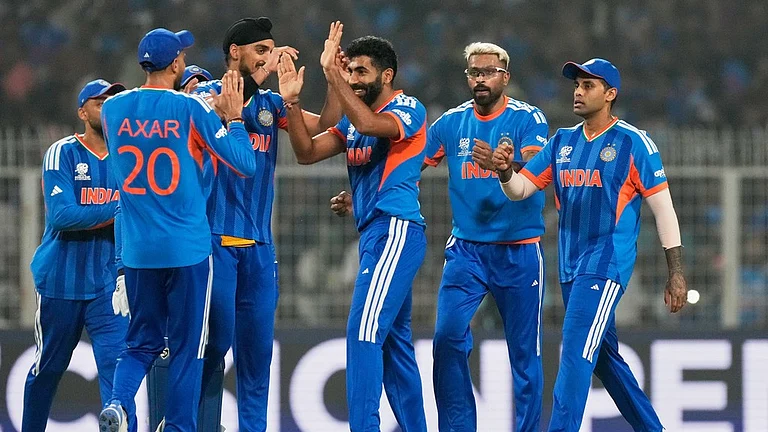Five persons convicted for the assassination of former Prime Minister Rajiv Gandhi were released on Saturday.
Nalini Sriharan, her husband V Sriharan alias Murugan, Santhan, Robert Payas, and Jayakumar were on Saturday released from Tamil Nadu prisons. The sixth convict named AG Perarivalan was released in May.
Nalini had been on parole for a month prior to her release on Saturday. Immediately after she was released from the special prison for women in Vellore, she went to the Vellore central prison from where her husband Murugan. Murugan and Santhan were taken in a police vehicle following their release to the special refugee camp in Tiruchirappalli Tamil Nadu. Robert and Jayakumar, released from the Puzhal prison in Chennai, were taken to the special refugee camp in Tiruchirappalli to be lodged there.
Murugan, Santhan, Robert, and Jayakumar are Sri Lankan nationals.
The Supreme Court on Friday ordered the release of five convicts serving life term for about three decades in the Rajiv Gandhi assassination case, noting that its earlier order releasing another convict Perarivalan was equally applicable to them.
Rajiv was assassinated on May 21, 1991, by the Sri Lanka-based terrorist group Liberation Tigers of Tamil Eelam (LTTE) during an election rally. He was the second Indian prime minister to be assassinated after his mother Indira Gandhi, who was killed by her bodyguards.
Why did LTTE kill Rajiv Gandhi?
The LTTE chief Velupillai Prabhakaran decided to kill Rajiv after he intervened in Sri Lankan civil war in which LTTE was a major anti-government player.
Rajiv sent Indian military to Sri Lanka under the banner of Indian Peace Keeping Force (IPKF) in 1988. The Indian military was first dispatched with the objective of aiding Lankan authorities, but the mission changed with time, evolving first into counter-insurgency and eventually into a war in the jungles with LTTE, according to the think tank Gateway House.
The IPKF's mission ended in 1990 but that did not placate LTTE. The idea of Rajiv's return to power was so unacceptable to LTTE that it decided to kill him.
LTTE chief Velupillai Prabhakaran made the decision in November 1990 and set the operation in motion, according to an India Today story from 1991.
Anirudhya Mitra, the author of the book Ninety Days: The True Story of the Hunt for Rajiv Gandhi's Assassins, wrote, "Even before the National Front government [of VP Singh] finally collapsed, the LTTE had made up its mind to prevent Rajiv Gandhi from regaining power even if it required the ultimate deterrent — his assassination.
"Realising that Rajiv as prime minister would be a near-impossible target, it was decided that they should strike while his security status was still that of an Opposition leader and election campaigning would render him even more vulnerable."
Assassination and conviction of accused
There were eight "core" members in the LTTE squad that assassinated Rajiv. Together with bomber Dhanu, this group comprised Shivarasan, Murugan, Arivu, Shubha, and the three local "innocents" Bhagyanathan, Nalini and Padma, as per Minhaz Merchant's biography of Gandhi titled Rajiv Gandhi, End of a Dream.
The five squad members at the site of the assassination were Dhanu, Shivarasan, Nalini, Shubha, and Haribabu. While Haribabu, a photographer who was clicking a photo at the time of the blast, died at the scene with Dhanu, the other three fled the spot.
From this group, only Nalini was caught alive by the Indian investigators. The rest died by suicide. Shivarasan shot himself dead and others consumed cyanide as investigators traced them.
In 1998, a Terrorist and Disruptive Activities (Prevention) Act court in Chennai convicted 26 people and sentenced them to death in 1998.
In 1999, however, the Supreme Court acquitted 19 of the 26 convicts, commuted the death sentences to life imprisonments of three — Jai Kumar, Robert Pias, and Ravi Chandran, and upheld the death sentences of only four — Nalini, her husband Murugan, Santhan, and AG Perarivalan, as per a UNI report from 1999.
In 2014, the Supreme Court commuted the three death sentences and upheld in 1999 to life imprisonment.
Controversies in Rajiv Gandhi assassination case
Controversies have also surrounded convictions in the Rajiv Gandhi case. It emerged in 2013 that the confession that led to Perarivalan's conviction was false.
Former Central Bureau of Investigation (CBI) SP V Thiagarajan, who recorded the confession, told The Times of India that Perarivalan never said that he knew the battery he bought would be used to make the bomb that killed Rajiv. Thiagarajan admitted to altering Perarivalan's statement to show that he knew the purpose of the battery.
He said, "But he [Perarivalan] said he did not know the battery he bought would be used to make the bomb. As an investigator, it put me in a dilemma. It wouldn’t have qualified as a confession statement without his admission of being part of the conspiracy. There I omitted a part of his statement and added my interpretation. I regret it."
(With PTI inputs)






















